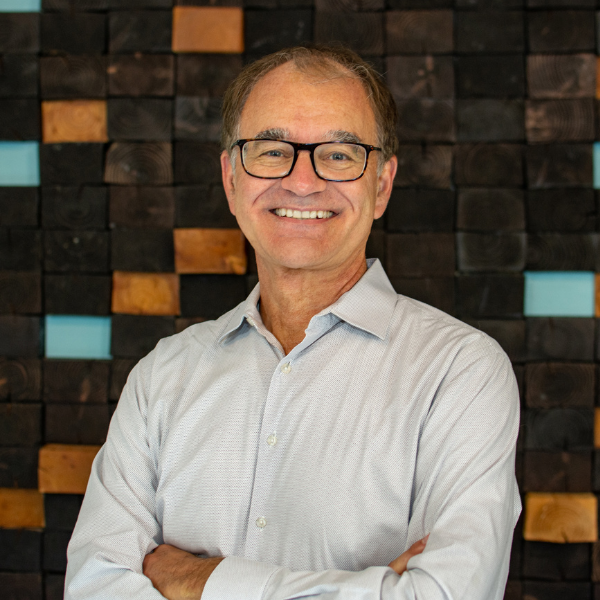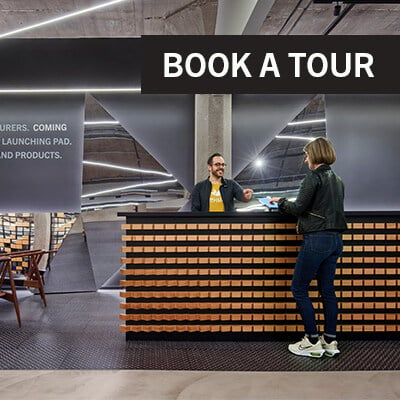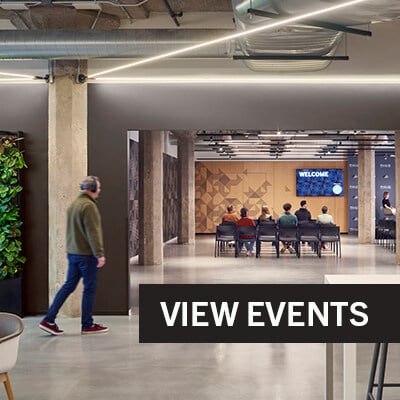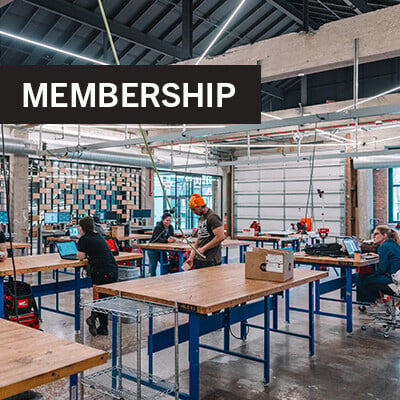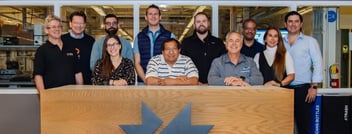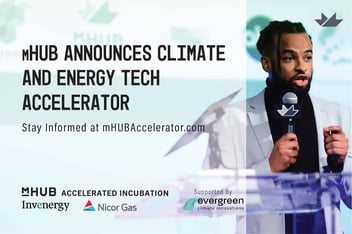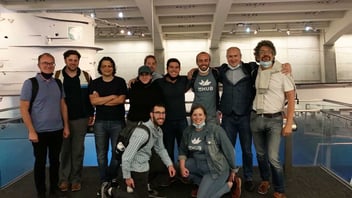Thierry Van Landegem is the Executive Director of mHUB’s Accelerator program. He has broad experience in setting up new businesses within corporations and launching startups. mHUB is a premier hardtech innovation ecosystem based out of Chicago.
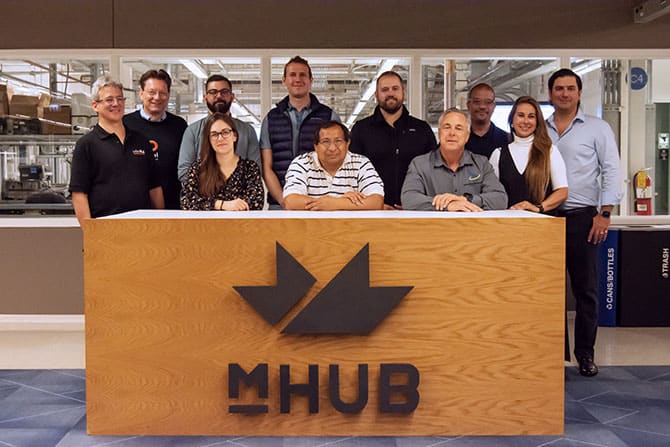
To say that time flies would be an understatement.
I met the eight teams of the mHUB EnergyTech Accelerator cohort three months ago. I had only spoken with each team a handful of times during the accelerator review and selection process, but that day we met beneath The Bean in Millennium Park, in the heart of the city, it felt like catching up with old friends.
What makes this group so wonderful is the variety of personalities and expertise behind every team. There are extroverts and introverts, visionaries and doers, analysts and pragmatists– each of them bringing a unique perspective and experience to the table. Still, the members of the cohort share a common goal: accelerating their businesses in the crucial, but highly competitive, and energy space.
They want to see their technology taking strides towards a net-zero economy. At mHUB, we have the capabilities, the mentors, the investors, corporate partners, and the community to help these startups achieve that goal.
Mentors who know first-hand difficulties hardtech founders face. Investors who realize the long game of investment in hardtech. Corporate partners that open doors to their clients and suppliers. And a community of hardtech founders that can help solve complex hardware problems. That is exactly who mHUB is.
The eight cohort teams are innovating technology to improve the efficiency of renewable energy, produce green hydrogen, develop efficient energy storage, capture carbon from the air, and more. These founders are passionately working to build a better future for the planet.
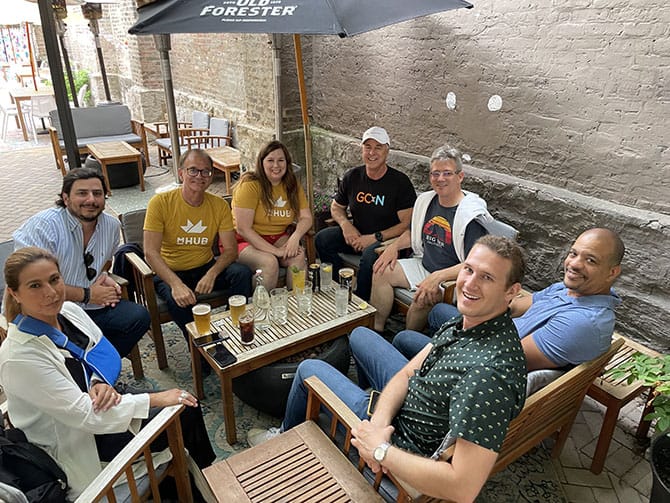
After our initial meeting, the cohort kicked off with a few weeks of intensive programming focused on customer discovery. The teams sought to identify a problem and their product solutions, as well as a target customer and market. What followed was an endless series of customer interviews, all in aid of understanding the journey ahead and to validate their hypotheses.
Initial prototyping was methodical: first sketches and mock-ups, then a looks-like and a works-like models to finetune basic product mechanics, functions, and designs. It was here, in mHUB’s prototyping lab, that cohort teams brainstormed critical product elements and features and designed the product for manufacturability. The founder teams are temporarily augmented with the necessary complementary skills to build that first prototype, or new release, or first product version.
In addition to product development support, mentor-matchmaking sessions during the first week matched each team with the mentor of their choosing. Our corporate partners Invenergy and Nicor / Southern Company also identified liaisons for each team, facilitating connections with possible clients and suppliers and identifying pilot opportunities. They continue to present topical seminars by their subject matter experts. Our community partner Evergreen Climate Innovations has brought essential networking relationships and legal partner Perkins-Coie has provided legal and regulatory support.
We are now half-way through the 6-month accelerator program. The half-way point marks the beginning of the business viability phase: developing the business model, financial model, and go-to-market strategy, among other components. The essence of this phase is about finding that first customer, that pilot, which is supported by all program stakeholders.
At this stage, cohort teams are primed for advice and wisdom from seasoned founders and entrepreneurs. In their conversations, teams can find motivation in their success stories and reassurance in lessons learned. They can also start perfecting their pitch.
At the program’s midway point, cohort teams took to the stage in mHUB’s event space to pitch their business and product-market fit to a select group of corporate partners. Despite only being at the half-way point in the accelerator program, these pitches were rich in content and polished.
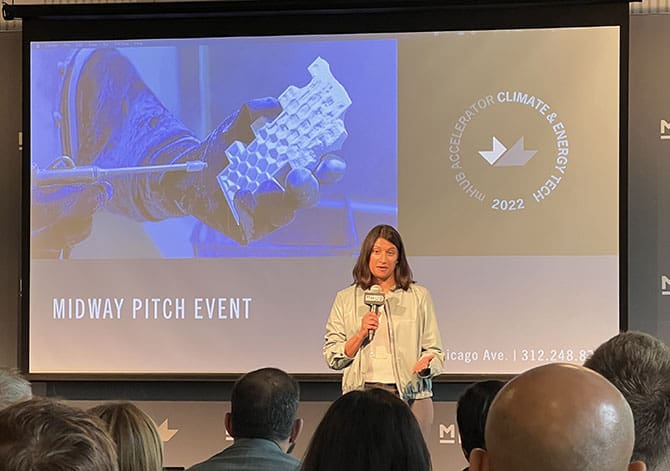
The recipe for a good pitch is simple: tell a story, keep it simple, and answer why? That why? is more a series of why? questions such as: Why my business/product? Why your investment? Why this market? Why now? And so on.
When a founder explains that their wish to cool their mother’s house without electricity had led them to build refrigeration systems powered by environmental heat – an audience is curious if their mother’s house is now cool and wants to know how.
It takes 8,000 years for carbon to be mineralized in sand. When a founder explains, with concision and clarity, that they can dramatically accelerate this process—an audience will pay attention.
When a founder cites a report that says 70,000 solar panels are installed every single hour and they can improve the efficiency of these systems—an audience can expect to understand the market potential for that founder’s product.
Each founder was challenged with grabbing the attention of the audience, maintaining their engagement, and addressing the why?’s of their product market fit and value.
Although these challenges are beneficial for founders to endure, the half-way pitch also presents an opportunity for select teams to receive a cash investment from mHUB corporate partners. As both partners indicated, they loved to see the teams’ energy and passion and hope to see that entrepreneurial spirit percolate through their own teams
These funding announcements will be made in the coming weeks as the eight teams undergo the next, and final, three months of the program. The next time they take to the mHUB stage will be in November 2022 at their Demo Day event for investors, industry, and stakeholder.
###
If you are interested in being contacted about the next open application window for the mHUB Accelerator, complete the interest form below.
